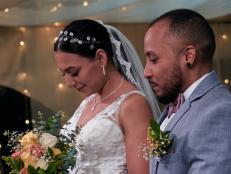Wedding Traditions from 90 Day Fiance: The Other Way Countries
Discover some of the beautiful wedding traditions from countries featured on 90 Day Fiance: The Other Way!

Colombia
Home to Tim’s fiancé, Melyza.
Colombia: Godfathers and Godmothers
In the U.S., brides and grooms often pick a maid of honor and best man. Similarly, in traditional Colombian weddings, the couple chooses a godmother and godfather, who offer marriage counseling and advice to the soon-to-be newlyweds.
Colombia: Candle Ceremony
Before the bride and groom say, “I do” they will both light a candle individually. Then, they’ll light a third candle together and blow out their separate flames as a way of symbolizing their joint union.
Mexico
Home to Kenneth’s fiancé, Armando.
Mexico: Las Arras
Celebrated in many Spanish speaking countries, Las Arras is a ceremony held during the wedding where the pastor will bless 13 gold coins that represent the Apostles of Jesus. Once blessed, the groom will exchange these coins for his bride as a way of signifying his commitment to support her. The act also demonstrates the couple's devotion to God and His place in their marriage.
Mexico: El Lazo
El Lazo, or the lasso, is a rope of flowers and rosary beads that is placed around the couple’s shoulders while a priest blesses their union. The lasso forms a figure eight around their bodies and represents their everlasting love.
India
Home to Jenny’s fiancé, Sumit.
India: The Bride Wears Red
Hindu weddings in India are largely recognized by their bold and alluring colors. Brides are donned in beautiful shades of bright red, which represents prosperity and fertility.
India: The Kanyadaan – When the Bride's Father Gives Her Away
Similar to American traditions, the bride’s father will give her away during the wedding ceremony. Where the moment differs, however, is when her father places the pair’s hands together and pours water onto his daughter’s hand, which then transfers down into the grooms.
Jordan
Home to Brittany’s fiancé, Yazan.
Jordan: Henna Night
Commonly held on a Wednesday, the henna night takes place at the bride’s house. Women in the groom’s family paint patterns with henna on the bride’s hands and serve traditional foods.
Jordan: Food, Food, Food
Jordanian weddings are popular for their delicious dishes, including a traditional food called mansaf. Mansaf consists of meat and rice and is meant to be eaten with your hands. Dig in!
South Korea
Home to Deavan’s fiancé, Jihoon.
South Korea: Grooms Present a Goose
Traditionally, and because geese mate for life, grooms will present their in-laws with a wild goose to symbolize their lifelong commitment to the future bride. Over time, this tradition (referred to as the Jeonanrye) became less literal and many grooms opt to present a wooden goose figurine instead.
South Korea: The Bride Wears Red and the Groom Wears Blue
Similar to many cultures, color schemes can hold great cultural significance. When following the ideas of Confucius, yin and yang (or the symbols of opposites attracting) are represented by the culturally feminine color red and a masculine shade of blue.
Ethiopia
Home to Ariela’s fiancé, Biniyam.
Ethiopia: Presenting Gifts
Two days before the wedding, a Telosh ceremony is held at the bride’s house–or her childhood home–with close family and friends. While there, the groom presents gifts to his soon-to-be bride, often including her wedding dress.
Ethiopia: The Kelekel
Three days after the wedding, a Kelekel is held where the friends and family who were unable to attend the ceremony can come and congratulate the couple. The Kelekel is hosted by the newlywed’s parents and, before its end, the parents bless their children before letting them leave for married life.




















